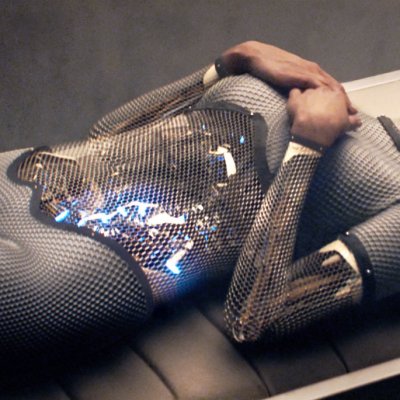Devs: Alex Garland on Tech Company Cults, Quantum Computing, and Determinism
Alex Garland walks us through the full implications of Forest's Devs project, why he doesn't believe in free will, and how tech companies can be scarier than any technology.

This article contains spoilers for the first four episodes of Devs.
Author Frederik Pohl had a phrase he liked to use about the responsibility of sci-fi writers: Their job is to “predict not the automobile but the traffic jam.” It’s fair to say then that author, screenwriter, and director Alex Garland has obsessed over a lot of traffic jams in the past 20 years.
The scribe behind films like 28 Days Later and Sunshine, Garland made his directorial debut with Ex Machina, an unnervingly believable vision of a tech company CEO becoming a modern day Frankenstein. Garland followed that up with the equally challenging and even more ambitious Annihilation. Now in his first limited television series, FX’s Devs, he returns to the quiet dread hatched on sunny Californian tech campuses, here embodied by the fictional Amaya. In the series, Amaya is a peaceful workplace surrounded by idyllic forests and an upbeat ethos that has made it the global leader in quantum computing—but they’re using it for secretive ends.
“I think my ambition would be to study the traffic jam that causes the accident,” Garland says when we run Pohl’s quote by him. “Looking at Devs, there’s two specific concerns. One of them is just to look at the weird nature of quantum mechanics, which seems to be a very good way of examining the world we live in and just how surprising and bizarre some of the implications of that are.” However, the larger concern is not the technology but the company using it.
“It’s about the way we perceive the companies,” Garland continues, “and, often, the way we personify and localize the people who lead them.”
The leader of Devs’ Amaya is a man named Forest, played by a terrific Nick Offerman. With his scraggly beard and long shaggy hair, Forest has that whole California Zen thing down pat, even as the hair is visibly thinning, and the beard graying. Like Steve Jobs and other vaunted tech geniuses of Palo Alto and the Bay area, Forest lives in a simple house and tries to exude an ethereal west coast sensibility. He also, perhaps by coincidence, looks like an over-the-hill Jesus Christ.
Garland admits that it’s tech company CEOs and the cults of personality they can develop that scares him. As Lyndon (Cailee Spaeny) says about Forest in the show, he isn’t a genius; he’s an entrepreneur.
“The thing that interests me is we keep treating entrepreneurs as if they’re geniuses,” Garland explains. “It’s like we’re all trying to drink the Kool-Aid. They’re serving it and we’re desperate to drink it. For me that’s the traffic jam rather than a phone or the messaging app, or the social media app.” And while he admits he exaggerates the worshipful (and maybe conspiratorial) tone of tech companies’ campuses, including those he’s visited in the past, he believes the depiction of Amaya in Devs belies a “devotional” reality.
Says Garland, “All you’ve got to do is look at a bit of film covering a product launch. We can see this enthusiasm and aggressive work for what is really just a bit of common, an object that is presented as if it’s the key to unlocking some secret to do with life when it’s basically a slight modification on something that we already have in our lives.”
Yet that difference between the common things a company can sell and the uncommon things they quietly develop is profoundly important. In Devs, the friendly exterior of Amaya with its enormous statue of a child—a literal monument to Forest’s lost daughter—is a public face to the actual profound work his Devs team is doing in a separate, highly secretive facility. Seemingly based in part on mysterious research and development wings of tech giants—think Google’s “moonshot” organizations at X Development and DeepMind—Devs is using quantum computing to change the world, all while keeping Forest’s Zen ambition as its shield.
“I think it helps, actually,” Garland says about Forest not being a genius. “Because I think what happens is that these [CEO] guys present as a kind of front between what the company is doing and the rest of the world, including the kind of inspection that the rest of the world might want on the company if they knew what the company was doing. So our belief and enthusiasm in the leader stops us from looking too hard at what the people behind-the-scenes are doing. And from my point of view that’s quite common.”
A lifelong man of words, Garland describes himself as a writer with “a layman’s interest in science.” Yet it’s fair to say he studies almost obsessively whatever field of science he’s writing about, which now pertains to quantum computing. A still largely unexplored frontier in the tech world, quantum computing is the use of technology to apply quantum-mechanical phenomena to data a traditional computer could never process. It’s still so unknown that Google AI and NASA published a paper only six months ago in which they claimed to have achieved “quantum supremacy” (the creation of a quantum device that can actually solve problems a classical computer cannot).
“Whereas binary computers work with gates that are either a one or a zero, a quantum qubit [a basic unit of measurement] can deal with a one and a zero concurrently, and all points in between,” says Garland. “So you get a staggering amount of exponential power as you start to run those qubits in tandem with each other.” What the filmmaker is especially fascinated by is using a quantum system to model another quantum system. That is to say using a quantum computer with true supremacy to solve other theoretical problems in quantum physics. “If we use a binary way of doing that, you’re essentially using a filing system to model something that is emphatically not binary.”
So in Devs, quantum computing is a gateway into a hell of a trippy concept: a quantum computer so powerful that it can analyze the theoretical data of everything that has or will occur. In essence, Forest and his team are creating a time machine that can project through a probabilistic system how events happened in the past, will happen in the future, and are happening right now. It thus acts as an omnipotent surveillance system far beyond any neocon’s dreams.
Admittedly, this comes from Garland’s own musings, as quantum computing hasn’t been around long enough for its implementation (and exploitation) to really be examined. However, it allows Garland to take a deep dive into another subject that fascinates him—determinism versus free will.
In the series, the first thing Forest and his team use the Devs computer to examine is the last words of Jesus Christ on the cross (the second is Marilyn Monroe and Arthur Miller’s wedding night). But as the computer pushes through all the hazy possibilities of what has occurred, it is essentially operating on a predetermined understanding of the universe. In other words, only what can happen has happened and will continue to happen. There is no free will about the future.
“The idea of looking into the past and future [comes separately from] quantum computing,” Garland says. “Because it’s just a product of context, which relates to everything being cause and effect. You could in fact argue quantum computing is a good way of disproving determinism, because there are some interpretations of quantum mechanics that are [nondeterministic].”
It’s a conflict that came to the fore in the most recent episode of Devs when programmer Lyndon seemed to find a way to make Forest’s computer have audio clarity by allowing the machine to filter events through a nondeterministic manner as opposed to a probabilistic state. That is to say, it introduced the many worlds theory and thus the multiverse.
“In some ways, what it’s done is it makes the machine work incredibly well,” Garland says before explaining why it enraged Forest so much he fired Lyndon. “In other ways, from Forest’s point-of-view, it starts to work extremely badly. The projection that he sees of his daughter may not be the projection that he wants to see because he may be seeing what would most inevitably be a version of one of the other worlds of his daughter. So for him, it’s totally unsatisfactory and he is effectively blinding himself to the good work that Lyndon has done because he finds it so frustrating.”
Of course frustration with determinism, free will, or the multiverse can create all sorts of confusion, albeit not for Garland. Whether or not he believes in the many worlds theory, he seems to think cause and effect already makes determinism’s case.
“I would say, to me, determinism makes a lot of sense and free will makes less sense. So I find myself allied on the no free will side, and it’s partly because I don’t see where free will is supposed to reside. I don’t think, for example, probabilistic quantum physics helps you or widens [your choices], because a probabilistic outcome is a decision like rolling the dice. It doesn’t mean you made a decision about whether the dice lands on a one or a three or a six. It was just a probabilistic outcome that you didn’t have any effect over. So for me, as a hunch, I go against free will.”
It’s an interesting perspective from a writer who admits that his characters take on a life and psychology of their own when he’s putting pen to paper. “They do, but in a predetermined way,” he laughs. Still, they can also reflect his own interests. Again, the first thing Forest does with his Devs machine is use it to project to Jesus on the cross—just as Lyndon further attempts to hear the actual final words of Christ with a nondeterministic equation. We think trying to eavesdrop on the purported son of God says a bit about people who built an all-powerful machine. But Garland says looking in on Jesus’ last moments would also be the first thing he’d use such a machine for.
“I’d really love to know what Jesus actually said while his hands and feet were being bled,” Garland considers. “Partly because I’m actually quite a big fan of his. I think he put out good ideas very beautifully, and they were very persuasive. But what I would then do is I’d keep going back and back and back. I’d just go past the dinosaurs to find the sort of the first instance of life occurring. And then I’d just want to keep rolling it back as far as it would go. If it went back to the Big Bang, who knows, maybe it could go a little bit further before that? Then you get into a weird debate about what time is, but I’d go back as far as possible.”
That sounds like the kernel of another science fiction story, and the head-on collisions it could create.
Devs is available now, exclusively on FX on Hulu.


